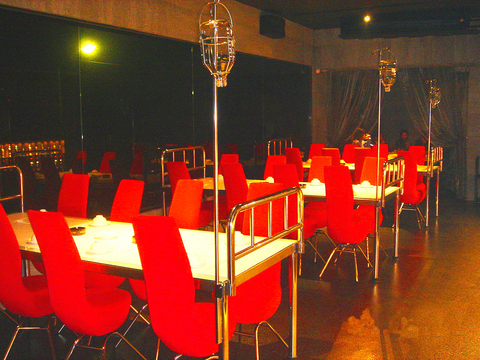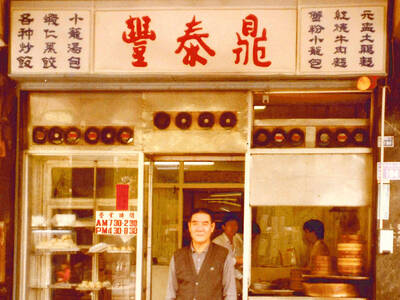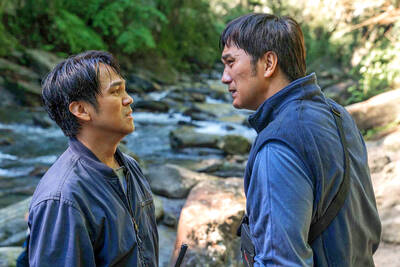When I stepped into DS Music Restaurant, I found it to be an extremely well-put-together, professional establishment with good food and a pleasant atmosphere that is night-lifey but not overwhelming. This disturbed me.
The reader is invited to consider the nurse fetish. It is an institution that lies at the heart of DS. And so I entered DS prepared to immerse myself in sleaze and then write ironically about it. What I found, though, was a disquietingly congruous marriage of unabashed hedonism and well-funded good taste.
Overall, DS looks like many other posh restaurant-and-bars, with lots of spot lighting, funny-shaped chairs, and clear alcohol bottles lit from underneath. Except that many of the tables look like sleek hospital beds, there are a few wheelchairs and crutches sitting around, backlit X-rays decorate some walls, and above each table hangs a big "IV drip," which functions like a small keg. And then, of course, there are nurses everywhere you look.

PHOTO COURTESY OF DS MUSIC RESTAURANT
The hospital theme is pervasive, but somehow subtle, or at least natural. I never thought I would say this, but it turns out that a wheelchair does not look out of place next to a wall of Smirnoff Ice bottles. There is something appealing about the audacity of taking a concept as (someone has to say it) flagrantly trashy as this and making something so cool out of it. To top it off, the food is good.
The menu consists of lightly Westernized Chinese, Japanese and Thai, with an inexplicable but not unwelcome Polynesian flare running through the presentation. The sashimi, for example, is served on a mountain of ice covered with leaves and flowers. The "Fire Pheonix Beer (sic)" (火鳳牛柳) is a successful beef-and-pineapple stir-fry served inside a hollowed-out half pineapple.
As is probably apparent in that last sentence, the English on the menu is more color commentary than viable translation. Some items -- like the pretty-good XO sauce stir-fry prawn ball (served on a bed of water convulvus) -- are more or less what they sound like, but the menu really isn't navigable without some knowledge of Chinese. Nor are the waitresses hired for their English.
It should be said that, DS, despite its thematically seamy underbelly, is family safe (the one exception is the Saturday night "showgirl" performance). The nurses outfits are not tailored to be especially kinky, and as far as I can tell the curtained-off "intensive care unit" is nothing more than a place where large groups can sit together.

March 24 to March 30 When Yang Bing-yi (楊秉彝) needed a name for his new cooking oil shop in 1958, he first thought of honoring his previous employer, Heng Tai Fung (恆泰豐). The owner, Wang Yi-fu (王伊夫), had taken care of him over the previous 10 years, shortly after the native of Shanxi Province arrived in Taiwan in 1948 as a penniless 21 year old. His oil supplier was called Din Mei (鼎美), so he simply combined the names. Over the next decade, Yang and his wife Lai Pen-mei (賴盆妹) built up a booming business delivering oil to shops and

Indigenous Truku doctor Yuci (Bokeh Kosang), who resents his father for forcing him to learn their traditional way of life, clashes head to head in this film with his younger brother Siring (Umin Boya), who just wants to live off the land like his ancestors did. Hunter Brothers (獵人兄弟) opens with Yuci as the man of the hour as the village celebrates him getting into medical school, but then his father (Nolay Piho) wakes the brothers up in the middle of the night to go hunting. Siring is eager, but Yuci isn’t. Their mother (Ibix Buyang) begs her husband to let

The Taipei Times last week reported that the Control Yuan said it had been “left with no choice” but to ask the Constitutional Court to rule on the constitutionality of the central government budget, which left it without a budget. Lost in the outrage over the cuts to defense and to the Constitutional Court were the cuts to the Control Yuan, whose operating budget was slashed by 96 percent. It is unable even to pay its utility bills, and in the press conference it convened on the issue, said that its department directors were paying out of pocket for gasoline

On March 13 President William Lai (賴清德) gave a national security speech noting the 20th year since the passing of China’s Anti-Secession Law (反分裂國家法) in March 2005 that laid the legal groundwork for an invasion of Taiwan. That law, and other subsequent ones, are merely political theater created by the Chinese Communist Party (CCP) to have something to point to so they can claim “we have to do it, it is the law.” The president’s speech was somber and said: “By its actions, China already satisfies the definition of a ‘foreign hostile force’ as provided in the Anti-Infiltration Act, which unlike